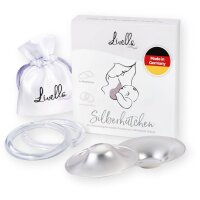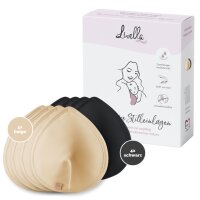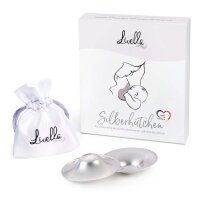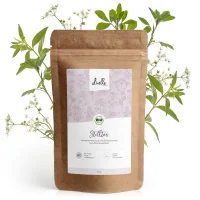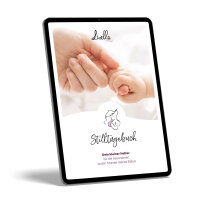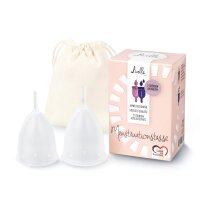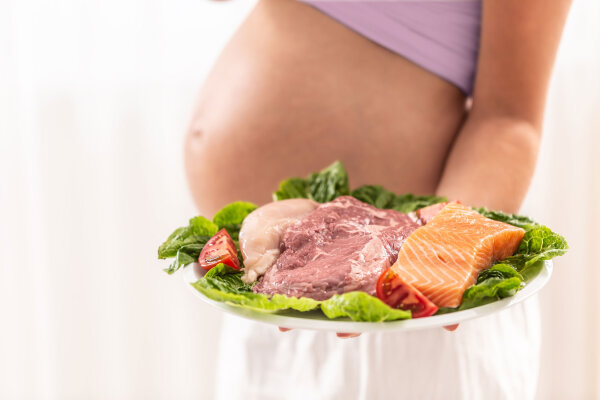In addition to fruit, vegetables and wholemeal products, a healthy pregnancy diet should also include meat. If possible, mums-to-be should eat between one and two portions of meat per week. However, there are some things to keep in mind when it comes to eating meat in pregnancy.
Is it safe to eat meat while pregnant? What type of meat can a pregnant woman eat? Why is raw meat bad during pregnancy? Read on as we answer all your questions about eating meat while pregnant.
Table of contents
Why is it important to eat meat during pregnancy?
Meat in pregnancy: Which meat is safe to eat?
Why is raw meat bad during pregnancy?
Tips for cooking meat during pregnancy
No meat during pregnancy: tips for vegan or vegetarian mums-to-be
Conclusion: Is it safe to eat meat while pregnant?
Why is it important to eat meat during pregnancy?
During pregnancy, the mother’s nutritional needs increase, especially the need for certain micronutrients. That’s why mums-to-be need to pay special attention to their diet. Expectant mothers who don’t eat a healthy, balanced diet risk developing nutritional deficiencies that can adversely affect both their own health and the healthy development of their baby.
The most common nutritional deficiencies in pregnancy include iodine deficiency, folic acid deficiency and iron deficiency. Eating meat during pregnancy is important for preventing low iron levels. That’s because meat not only contains important animal proteins but also a lot of iron. Red meat is especially high in iron, but other types of meat are also good iron sources.

Meat in pregnancy: Which meat is safe to eat?
It is generally recommended that women eat meat during pregnancy. But what kind of meat is good for pregnancy? And which meats are best avoided in pregnancy?
In theory, mums-to-be can eat chicken, pork and beef. When eating pork, however, pregnant women should be especially careful about cooking the meat thoroughly. Also, when buying meat and meat products, future mothers should choose low-fat products.
Good to know: Red meat might be a good source of iron, but women shouldn’t eat too much red meat during pregnancy because this could lead to gestational diabetes. Offal such as liver should be completely avoided during pregnancy even though it contains a lot of iron.
Why is raw meat bad during pregnancy?
When it comes to eating meat in pregnancy, the golden rule is: hands off raw meat! Raw meat products include mince, tartare, carpaccio, steak, salami, raw ham, smoked bacon and smoked duck breast. All of these foods should be avoided during pregnancy. But why is eating raw meat during pregnancy such a bad idea?
The reason why raw meat is a no-go during pregnancy is that it might lead to infections like listeriosis and toxoplasmosis which are caused by listeria bacteria and toxoplasma gondii parasites respectively. Both listeria and toxoplasma germs can enter the mother’s body through contaminated meat and cause an infection.
Infections caused through contaminated foods always carry a certain risk. During pregnancy, however, the consequences of a listeriosis or toxoplasmosis infection can be even more severe. The infections can harm the baby and might even cause miscarriage or stillbirth.
Therefore, mums-to-be shouldn’t eat raw animal products. Apart from raw meat, this includes the consumption of raw milk products and raw or smoked fish during pregnancy.
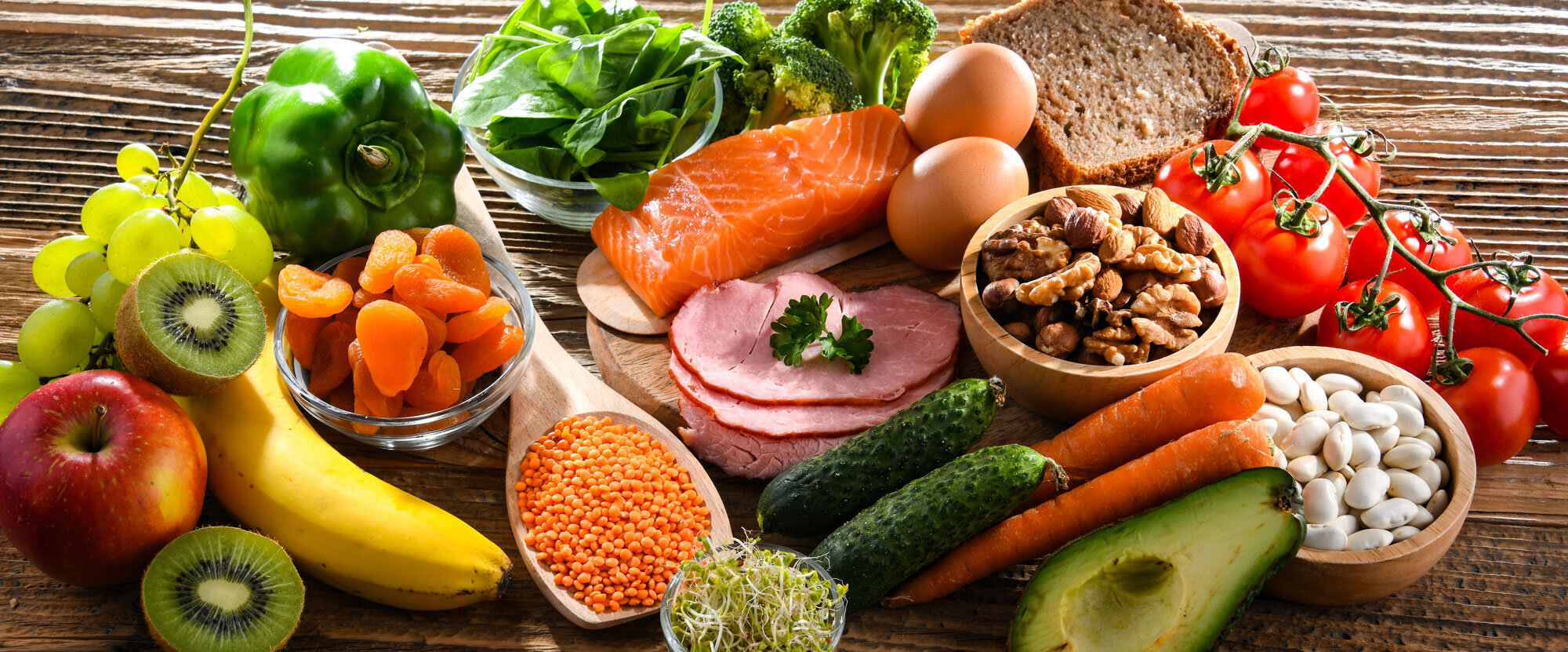
Tips for cooking meat during pregnancy
Good kitchen hygiene and proper cooking of meat and meat products are key to preventing infections like listeriosis or toxoplasmosis during pregnancy.
Here is an overview of the most important food safety rules in pregnancy.
- Make sure that meat is thoroughly cooked: Both listeria and toxoplasma parasites are killed when food is cooked at high temperatures. Therefore, mums-to-be should make sure that meat is always thoroughly cooked. In order to achieve this, the meat must be cooked at temperatures higher than 70°C for at least two minutes. After cooking, the meat should have a greyish colour with no traces of pink in it and the juice should run clear.
- Ensure that kitchen utensils are properly cleaned: Good kitchen hygiene is also important when it comes to ensuring food safety in pregnancy. Mums-to-be should thoroughly wash their hands before and after touching raw meat. Also, all kitchen utensils and surfaces that have come into contact with the meat should be thoroughly cleaned afterwards.
- Prefer low-fat cooking techniques: Thoroughly cooking meat is crucial for preventing infections from contaminated foods. However, mums-to-be should also be careful when deciding how to cook meat during pregnancy. If possible, choose low-fat cooking methods.
- Store meat properly: Raw meat should be stored in the fridge and it should be cooked as soon as possible. This means storing meat at temperatures between 4°C and 6°C for no longer than two to three days. Also, raw meat should be stored in a place that is separate from processed foods.
No meat during pregnancy: tips for vegan or vegetarian mums-to-be
Not eating meat during pregnancy doesn’t necessarily lead to iron deficiency. Pregnant women who eat plenty of eggs, milk products, pulses and wholemeal products generally don’t need to worry about developing iron deficiency. If necessary, an appointment at the doctor’s can help get clarity on whether it makes sense to take iron supplements or not.
For mums-to-be who follow a vegan diet, however, it’s a different story. For them, there is no way around taking dietary supplements to prevent low iron in pregnancy. In the case of a vegan pregnancy, seeking advice from a doctor or midwife is indispensable.
Conclusion: Is it safe to eat meat while pregnant?
Mums-to-be need to follow different rules when it comes to eating meat in pregnancy. Here are the most important rules and facts at a glance.
- It is not safe to eat raw meat during pregnancy because it might be contaminated with bacteria and other germs that can be harmful to the baby. The same goes for cold cured meats.
- During pregnancy, meat needs to be cooked thoroughly at all times. This means that the internal cooking temperature must reach 70°C for at least two minutes.
- Cooking utensils and kitchen surfaces should be cleaned thoroughly. Also, mums-to-be should wash their hands before and after preparing raw meats.
- Raw meat should further be stored in a place that is separated from other foods. It should not be stored for longer than two or three days.
References
- Handlungsempfehlungen - Ernährung in der Schwangerschaft | DGE
- Listeriose und Toxoplasmose: Was können Schwangere zur Vorbeugung tun?- Gesund ins Leben (gesund-ins-leben.de)
- So schützen sich Schwangere vor Lebensmittelinfektionen (frauengesundheitsportal.de)
- Listeriose und Toxoplasmose - Sicher essen in der Schwangerschaft (bvlk.de)
- Ernährung in der Schwangerschaft (aok.de)







